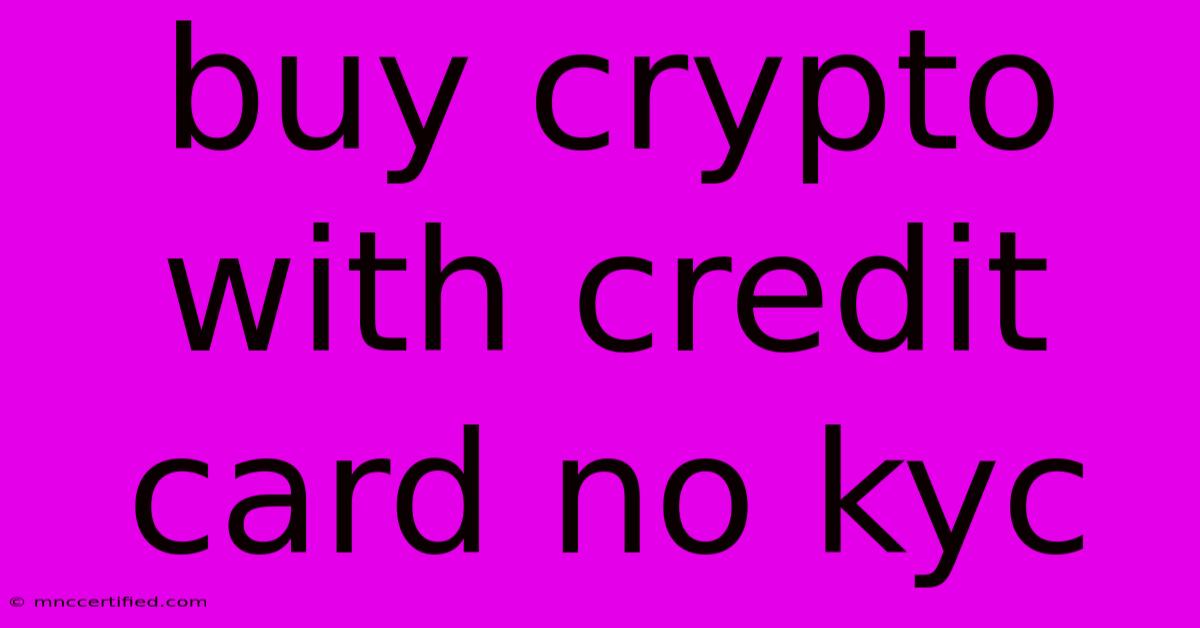Buy Crypto With Credit Card No Kyc

Table of Contents
Buy Crypto with Credit Card: No KYC? (The Risks and Alternatives)
The allure of buying cryptocurrency with a credit card is undeniable – instant access, convenience, and the potential for rapid gains. However, the "no KYC" aspect of this equation is often a red flag.
While the idea of purchasing crypto anonymously might sound enticing, it's crucial to understand the associated risks and potential pitfalls. This article will explore the realities of buying crypto with a credit card without KYC, the dangers involved, and safer alternatives.
The Truth About "No KYC" Crypto Purchases
The term "no KYC" when it comes to crypto purchases is often misleading. While some platforms might claim to offer this, it's important to remember:
- Regulations: Most reputable cryptocurrency exchanges and platforms are bound by Anti-Money Laundering (AML) and Know Your Customer (KYC) regulations. This means they are required to verify your identity to comply with legal frameworks.
- Security: Even platforms claiming "no KYC" often collect some basic information, like an email address, to prevent fraud and ensure the security of their platform.
- Hidden Costs: "No KYC" platforms may charge exorbitant fees, have questionable security protocols, or even be outright scams.
The Risks of Buying Crypto with Credit Card "No KYC"
Here's why you should be wary of buying crypto without proper KYC:
- Scams: You might be dealing with a fraudulent platform that disappears with your funds.
- High Fees: These platforms often charge high transaction fees and hidden charges.
- Lack of Protection: You have no consumer protection if something goes wrong, and there is no guarantee you can recover your funds.
- Limited Liquidity: You might struggle to sell your crypto quickly or find buyers on these platforms.
- Legal Risks: Engaging in unregulated transactions can have legal consequences.
Safer Alternatives to Buying Crypto with Credit Card
While the idea of bypassing KYC might seem tempting, it's far safer and more secure to opt for reputable platforms that comply with regulatory standards. Here are some alternative approaches:
- KYC Compliant Exchanges: Platforms like Coinbase, Binance, Kraken, and others require you to provide basic identity verification, but they offer greater security, better liquidity, and customer protection.
- Peer-to-Peer (P2P) Platforms: These platforms connect you with other users for direct crypto transactions. While they might require some level of trust, they offer a more decentralized and potentially more private way to buy crypto.
- Crypto ATMs: Some crypto ATMs allow you to buy crypto with cash, though they often charge higher fees.
- Using a Debit Card: While it's not entirely "no KYC," using a debit card to buy crypto is generally safer than a credit card because you're using your own funds, not borrowing money.
Important Considerations Before Buying Crypto
- Do your research: Choose a reputable platform with good security measures and a strong reputation.
- Understand the risks: Cryptocurrency is volatile, and there's always the risk of losing money.
- Diversify your investments: Don't put all your eggs in one basket.
- Never invest more than you can afford to lose: Always be aware of your risk tolerance.
Conclusion
While the allure of buying crypto with a credit card without KYC might seem appealing, it's a risky proposition. It's far safer and more secure to choose reputable platforms that comply with regulatory standards. Remember, your financial security is paramount, and choosing the right platform is essential.

Thank you for visiting our website wich cover about Buy Crypto With Credit Card No Kyc. We hope the information provided has been useful to you. Feel free to contact us if you have any questions or need further assistance. See you next time and dont miss to bookmark.
Featured Posts
-
Commanders Vs Eagles Where To Watch And Listen
Nov 15, 2024
-
Onion Buys Alex Jones Media Firm
Nov 15, 2024
-
New Zealand Parliament Interrupted By Maori Group
Nov 15, 2024
-
Smythson Of Bond Street Stationery
Nov 15, 2024
-
Summit Specialty Insurance Company
Nov 15, 2024